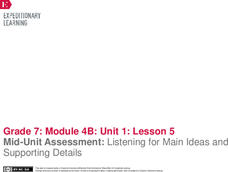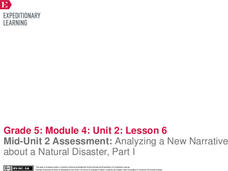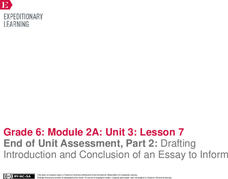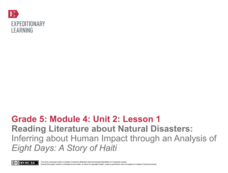Baylor College
Water: Post-Assessment
Very simply, the science class will discuss what they have learned during The Science of Water unit and take a multiple-choice post-assessment quiz. A few other closing activities are suggested for you to choose from, such as having...
EngageNY
Mid-Unit Assessment: Listening for Main Ideas and Supporting Details
Pay attention! Scholars view the video"Why College Students Should Start Paying Attention to Water" multiple times to complete a note catcher. After discussing their thoughts with the class, learners watch "The Water Crisis Isn’t...
EngageNY
End of Unit Assessment: Tracing and Evaluating Arguments
Give water the attention it deserves. Scholars watch Corporations Need to Pay More Attention to Water and respond to questions as part of their end of the unit assessment. They then complete the assessment by reading and responding to...
EngageNY
Mid-Unit Assessment: Tracing an Argument in an Article and a Video
Pesticides—unnecessary pollutants or positive application? Learners watch a video about DDT and read Rachel Carson: Sounding the Alarm on
Pollution for their mid-unit assessment. They complete graphic organizers, answer multiple-choice...
EngageNY
Mid-Unit 2 Assessment: Analyzing a New Narrative about a Natural Disaster, Part I
Scholars complete a mid-unit assessment by analyzing a narrative text, In the Middle of the Storm. Learners determine the gist of the text, identify synonyms, make inferences, and answer text-dependent questions to demonstrate...
EngageNY
End of Unit Assessment: Perspectives on Natural Disasters
Caption this! Scholars complete the end of unit assessment by rereading In the Middle of the
Storm. Learners answer written response questions about the text, and then create drawings to accompany their work. To finish, they caption the...
Baylor College
Why Is Water Important? Pre-assessment
This water worksheet is just the tip of the iceberg! It a multiple-choice quiz meant to be a pre-assessment for a wonderful water unit. There are 10 questions to be answered regarding the role, properties, and behavior of water. Make...
EngageNY
Mid-Unit 1 Assessment: Inferring with Pictures and Text
Mark the mid-point in the module with the authentic assessment described and provided here—the assessment and the unit focus on inferring using pictures and text. Pupils are given an image, a graphic organizer, and an article and must...
EngageNY
End of Unit Assessment, Part 2: Drafting Introduction and Conclusion of an Essay to Inform
A powerful introduction and conclusion can really pack a punch. Using the resource, scholars first read and discuss a model essay. Then, as part of the end of unit assessment, they draft the introductory and concluding paragraphs of...
EngageNY
Reading Literature about Natural Disasters: Inferring about Human Impact through an Analysis of Eight Days: A Story of Haiti
This is a disaster. Scholars look through the book Eight Days: A Story of Haiti and discuss their wonderings about the text and natural disasters. They then complete a first read to determine gist and second read to answer text-dependent...
K5 Learning
The Sun and the Stars
How are the stars similar to the sun in our galaxy? Learn all about the solar system with a reading excerpt about the sun and the stars. Kids read an informational passage before they answer questions about reading comprehension,...
Baylor College
Needs of Living Things: Post-Assessment
Assess your class's knowledge of the needs of living things with the final lesson in a series. Given a large piece of paper and coloring utensils, young scientists draw a picture of themselves and a plant or animal of their choosing,...
EngageNY
Mid-Unit Assessment: Analyzing Author’s Purpose in Speech and Text
Part one of a mid-unit assessment relating to The Omnivore’s Dilemma includes listening to and analyzing a speech by Birke Baehr. Part two involves analyzing an excerpt from the text. The assessment ends with short response questions.
EngageNY
Resource Materials and Gathering Information: Reading Another “Choice” Text from the Research Folder
Look it up. Scholars use a dictionary and thesaurus to verify the meaning of the research vocabulary words they defined in the previous activity. They then use sticky notes to write a synonym for each word. Finally, individuals choose a...
Mathed Up!
Reading Scales
After watching a video on how to read different types of scales, young mathematicians complete eight problems involving scales. From thermometers to number lines to rulers and clock, class members identify various numbers on scales.
Baylor College
Post-Assessment: Global Atmospheric Change
Find out how much your earth scientists learned about the atmosphere in the unit on global atmospheric change with this assessment. After writing a letter to persuade others to make changes to protect our atmosphere, pupils take the same...
PreKinders
Pre-K Assessment Forms
This is a Pre-K teacher's must-have resource for pre-assessing learners at the beginning of the school year! Covering everything from alphabet recognition and sorting objects to social-emotional development and work habits, this resource...
Baylor College
Pre-Assessment: Earth's Energy Sources
A ten-question, multiple-choice quiz assesses what your elementary earth scientists know about the atmosphere both before and after a unique unit on global atmospheric change. Make sure to check out the activities and lesson plans...
Baylor College
What is Air? Pre-Assessment
First, estimate existing knowledge about air with a class discussion. Then, hand out a 10-question pre-assessment quiz to record how much pupils know to compare to their knowledge later. This will also give mini meteorologists the...
Novelinks
Sense and Sensibility: Final Assessment: Movie Maker
Assess your class's understanding of Jane Austen's Sense and Sensibility with a fun and creative final project. Using what they have learned about the novel's characters, they create presentations featuring music and images that best...
Science Matters
Earthquakes and Volcanoes Post Assessment
The final lesson in the 20-part series is a post assessment covering earthquakes and volcanoes. Twenty-three questions incorporate each of the previous lessons through multiple choice, justified multiple choice, expanded multiple choice,...
Achieve3000
Oral Reading Fluency
Accuracy, phrasing, flow, and pace, the four traits of of oral reading fluency, are the focus of a series of exercises that are designed to help readers develop these comprehension and literacy skills.
EngageNY
Mid-Unit 1 Assessment: Analyzing an Interview with a Rainforest Scientist Part 1
What's it like to study snakes, reptiles, and turtles in their natural habitats? Serving as the mid-unit assessment, pupils read an interview with a rainforest scientist. Next, they analyze the text and answer text-dependent questions.
Mr. Nussbaum
Abraham Lincoln Reading Comprehension—The Presidential Years (Part 3)
Abraham Lincoln abolished slavery and led the Union out of the most tumultuous time in American history. An informative passage and paired questions evaluate learners' understanding of main ideas, supporting points, and domain-specific...
Other popular searches
- Reading Assessment Test
- Reading Assessment Retelling
- Reading Assessment Rubrics
- Authentic Reading Assessment
- Informal Reading Assessments
- Pearson Reading Assessments
- Reading Assessments Tests
- Reading Assessment Phonics
- Reading Assessment Pre Test
- Ongoing Reading Assessment
- Reading Assessment Pre Test
- Early Reading Assessments

























